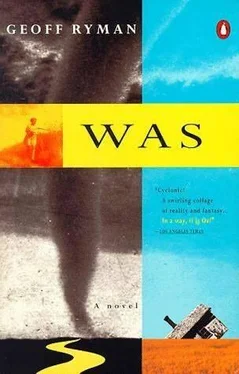Millie wanted to hear. She crept up a bit closer.
"Like this," he was saying. "Just breathe out at the top of your register, a whisper right in the front of your mouth." He said the line for her. Reason he was so good. A bit eccentric. Studios were full of stories about how he would tell producers off. Maybe why he sometimes ended up finishing other people's pictures.
The Kid lay back as Continuity fussed with the quilt.
And something happened again. The Kid's eyes went faraway.
King was bustling around with the camera, looking through it on tiptoe. A small man physically, lots of energy. Kid closed her eyes and went still as a corpse.
"Okay, going for a take."
It was just the Kid on the pillow, her eyes closed, and she began to murmur over and over the last line: "There's no place like home. There's no place like home."
Millie felt a prickle down her neck. Kid really sounded like a little girl, for all that the brace had to hold down her chest.
"Right," said King, sounding surprised. "That was just what I wanted."
They set up another shot. More huddling between Vidor and the Kid. Millie went to freshen her makeup, but didn't hear what Vidor said. As Millie touched up the eyebrows, the Kid started to sing to herself. "Zing Went the Strings of My Heart."
She kept on singing it, softly, as the lights and the cameras were moved.
There was a rustle of paper on a clipboard.
"Dog," said Continuity. "The dog jumps up on the bed halfway through the scene. And Dorothy is already sitting up and holding it."
"Terry? Terry?" called the dog's trainer. "Dog's shy," he explained to Vidor.
"Where's the dog?" called Vidor, annoyed.
"Here, dog," whispered the Kid. Only Millie seemed to hear her. "Up'n the bed."
It sounded like Missouri. Or Kansas. Darned if the dog didn't come too, right up on the bed out of nowhere. You are a country girl, aren't you, honey, thought Millie. They couldn't have found somebody better for this part in a million years. A country girl who got picked up, spun around and dropped into Hollywood and Technicolor.
Vidor sat Blandwick down and pulled her shoulders into the frame. Cameraman kept shaking his head.
Ten minutes, maybe twenty. Hours of waiting. It was amazing how these actors could sit and wait and wait and then just launch themselves into it. Mind you, that's why they were paid. To be able to say lines like they believed them. The Kid started singing again.
Finally Vidor said, "Okay, let's go. Dorothy, your last lines from 'Anyway, Toto, we're home.' "
The camera whirred, Vidor pointed, the Kid said her line, and it was wrong.
On the word "home," her face crumpled up and she started to cry. Not modulated. Ugly, wet, snotty.
"No, no, no, no, no," said Vidor, waving at the cameraman to stop.
Vidor stepped forward and spoke loud enough for most of them to hear. "Uh, Dorothy. That's probably a bit too sad. Remember, she's home, she's happy, everybody she loves is back with her in one place. She's probably never been as happy, and probably never will be as happy again. So what we want to see is joy. Joy like we've never seen it. This has got to be the happiest part of the whole picture."
The Kid smiled and smiled and nodded yes and darned if she wasn't still crying. Anything to please, thought Millie, rolling the gum in her mouth.
They tried again, and this time, the Kid sputtered and burst into tears with a kind of spurting sound. Vidor cut the air with his hand.
She went too far, sometimes, the Kid. When she first saw Lahr in his makeup, she went hysterical. They couldn't stop her laughing. She had to hide behind the set and say over and over "I must not laugh, I must not laugh," and then she came out and started laughing all over again. Finally Fleming slapped her right across the chops. That stopped her laughing all right.
Vidor scratched his brow with his thumb, thinking. Then he walked up to the bed and leaned over it and spoke low and soft, like a daddy to his little girl. "Frances," he said.
The Kid turned to him, startled. "Frances, just pretend you've gone to sleep, and you wake up back in your own house, just like it used to be when you were little with your mommy and your daddy and your sisters. All there, all home. Just close your eyes."
He stepped back quietly. The Kid stroked the dog. It licked her arm.
"Now open them," said Vidor.
She did.
"And you're home," said Vidor.
The lights came up fierce, and so did the Kid. Suddenly she smiled, and the smile cut through the one wall of the set that faced her and the camera and the lights.
There was silence. They all waited in silence, and King motioned tor the whirring of the camera to keep going. The Kid kept staring. Was she going to say anything?
She told Toto they were home. Home, like she couldn't believe it, it was so wonderful to be back.
And this was her own room, and they were all there together, everyone she loved, and she wasn't going to go away, ever again. Oh yes you are, thought Millie. Life takes you away. Don't believe that down-on-the-farm shit, kid. "And, oh Aunty Em? There's no place like home!"
It was strange. Everyone stayed silent for a while. Somebody coughed, like they were saying: Can we move now? People went back to work.
There was one thing that Millie could tell people about her job that was true, and that was that the good actors, the ones who could actually act, were really nice, nice inside. Oh, sure they acted up; they were childish; they were like little kids. There was something childish about each one of them.
"Ray, Bert, Jack," said King Vidor, and they came in a parade, dressed as farmhands. Lahr who couldn't sleep from fear. Bolger who wanted to go to college. Jack who showed them how to say their lines like children-rumor was he wanted to start a charitable foundation. He was the one who wanted a heart. Yup, thought Millie.
All these people working together on something, sometimes it all comes together. Looks like maybe this picture is. That business with the coat. The Professor is wearing L. Frank Baum's coat. If Judy Garland really is a nice country kid, then maybe the coat is real too.
And the Kid was beaming, still smiling, in the lights, where home would continue to be. The only place it would be, in the center of attention.
Santa Monica, California-January 1953
The only thing she was good for was spreading chaos and fear. -Judy Garland, of her mother
The parking lot looked empty. Ethel swung her car around, looking at the space she was aiming at, and nearly hit an old Ford. She slammed on the brakes, reversed, wrenching the steering wheel around, slammed into forward, straightening the car, and roared back neatly into the space. Her heart was thumping. Late. Late again, darn it, she was never late, and suddenly twice in one week. Why am I always late for everything, she admonished herself. Then she looked at her watch.
It said six forty-five.
It was like a blow to the chest. What? She was an hour early. Of all the stupid… She'd misread the time. All that panic, missing her breakfast, dashing out to the car, makeup to be done later. Screaming up Sepulveda, only half noticing how empty the streets were, praising the Lord that the traffic was light for once, tearing into the lot and then thump, here she was, thump, parked in the McDonnell Douglas parking lot an hour early with nothing to do on the coldest day of the year. She looked over her shoulder. Even the chow shop on the corner hadn't opened yet.
She sat and went very still. She closed her eyes. Something heavy and sluggish settled over her like mud. What a panic! And for nothing.
The little Dodge smelled of gas and Ethel felt sick, a queasy, floating nausea that was not altogether unpleasant. After the iron pressure of the race across town, it was nice to find she could sit for a spell and relax.
Читать дальше












